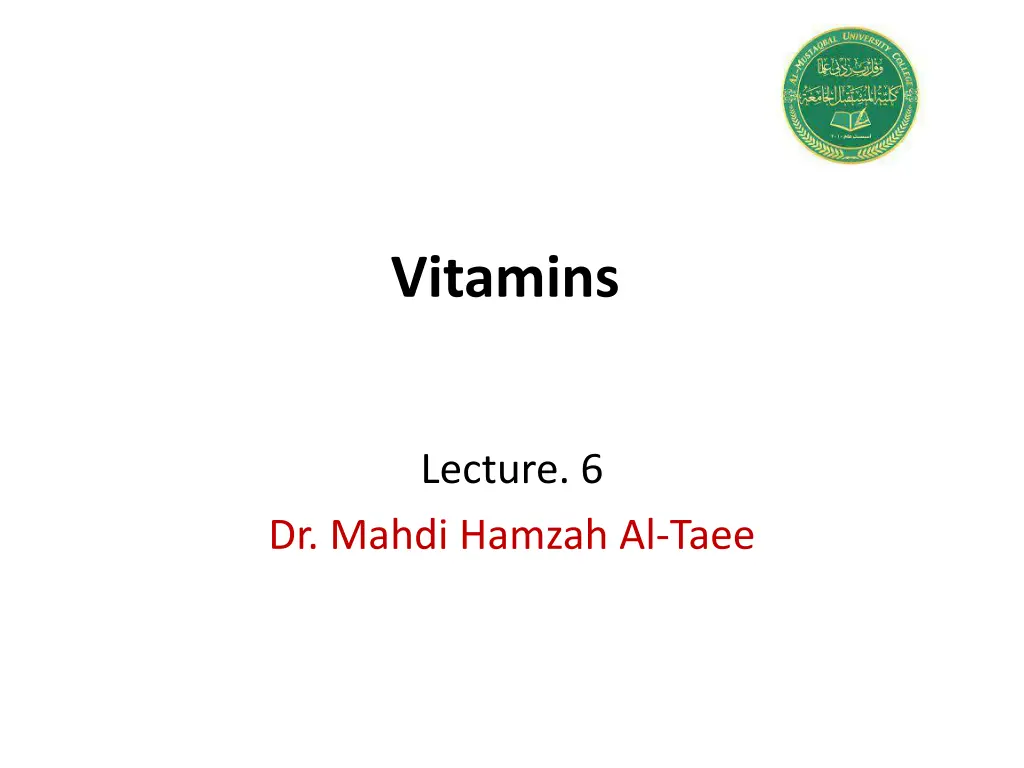
Understanding Fat-Soluble and Water-Soluble Vitamins
Explore the importance of vitamins in the human body, including fat-soluble and water-soluble vitamins. Learn about sources, functions, and potential deficiencies of essential vitamins like A and D. Discover the role of vitamins in maintaining health and promoting normal growth.
Download Presentation

Please find below an Image/Link to download the presentation.
The content on the website is provided AS IS for your information and personal use only. It may not be sold, licensed, or shared on other websites without obtaining consent from the author. If you encounter any issues during the download, it is possible that the publisher has removed the file from their server.
You are allowed to download the files provided on this website for personal or commercial use, subject to the condition that they are used lawfully. All files are the property of their respective owners.
The content on the website is provided AS IS for your information and personal use only. It may not be sold, licensed, or shared on other websites without obtaining consent from the author.
E N D
Presentation Transcript
Vitamins Lecture. 6 Dr. Mahdi Hamzah Al-Taee
Vitamins: are organic nutrients that are required in small amounts to perform biochemical functions of normal growth and health of human body. Vitamins generally cannot be synthesized by the body and must therefore be supplied by the diet.
Classification of vitamins: 1. Fat soluble vitamins which include vitamin A, vitamin D, vitamin E and vitamin K. Water soluble vitamins include vitamin C and vitamin B complex Vitamin B complex includes: thiamine (B1) riboflavin (B2) niacin (B3) pantothenic acid(B5) pyridoxine (B6) biotin (B7) Folic acid and (B12). 2.
Fat soluble vitamins(A,D,E,K): Transported through the blood by lipoproteins. Stored in the liver. High doses consider toxic.
Vitamin A Sources: Animals: liver, whole milk, cream. Plants: (carrots, tomato, apricot), etc. Functions: 1. Maintenance of vision 2. Increase release of calcium, phosphate in the bone 3. Maintenance of mucous membranes and healthy skin . 4. Growth and development of bones. 5. Healthy immune system
Deficiency Vitamin A causes: 1. Night blindness. 2. Respiratory infections. 3. Bone growth ends.
Vitamin D (anti rickets) Vitamin D3: Sources: eggs, butter, liver, fatty fish, sun exposure. Functions: 1. Regulation of absorption of Ca and phosphors from small intestine 2. Building and maintenance of normal bone and teeth. 3. Necessary for growth and development.
Deficiency Vitamin D : 1. Cause hypocalcemia and hypophosphatemia. 2. Rickets in children. 3. Osteoporosis. 5. Poorly developed teeth and bones. 6. Muscle spasms.
Excess of Vit D (toxicity) causes: loss of appetite Vomiting Growth failure weight loss Ca deposit in blood vessels and kidneys. Vitamin D toxicity is usually caused by extra-large doses of vitamin D supplements not by diet or sun exposure.
Vitamin E (Antifertility): Functions: 1. antioxidant 2. Protects erythrocytes. Deficiency: 1. Reduced activity of certain enzymes 2. Hemolysis of RBC 3. Muscular weakness. 4. Anemia.
Vitamin K (Coagulation): are essential to blood clotting. Sources: broccoli, spinach, dairy products, eggs, meats, fruits. Deficiency: 1. Delayed blood clotting by increases clotting time. 2. Faulty fat metabolism.
Water-Soluble Vitamins: Include Vitamin B complex and C. 1. Dissolve in water 2. Not stored in the body.
Vitamin C: Important role in the formation of collagen, During trauma, fever need more amount of vit. C. Sources: citrus fruits, melon, tomatoes, potatoes. Excess of vitamin C causes: 1. kidney stones 2. Headache, weakness, irritability and insomnia. Deficiency: 1. Bleeding gums 2. Loose teeth. 3. Poor wound healing
Vitamin B Complex Vitamin B1 (Thiamine): Function: 1. Protein metabolism as (coenzyme). 2. Needed for healthy nerve. Deficiency: Beri Beri (disorder of nerve system). Beriberi is a disease that affects the nervous, cardiovascular, and gastrointestinal y stems.
Vitamin B2 Sources: liver, eggs, milk, fish, green vegetables. Deficiency causes: 1. Inflammation and break down of tissue around the mouth, tongue, nose. 2. Dermatitis 3. impaired wound healing
Vitamin B3 (Niacin) Sources: liver, kidney. Deficiency 1. Glossitis. 2. Skin rashes.
Folate (Folic Acid): 50% to 90% of folate may be destroyed during food processing and preparation. Requirements: 400 gm for female and male. The recommended amount for a woman 1 month before conception and through the first 6 weeks of pregnancy is 600 g / day. Function: 1. Play important role in synthesis of hemoglobin. 2. Play important role in synthesis of nucleic acid. 3. Play important role in synthesis of methionine.( amino acid in protein) 4. Deficiency: anemia
Vitamin B6 : (Pyridoxine): Vitamin B6 is essential for protein metabolism and absorption. Deficiency causes: irritability depression dermatitis In infants: its deficiency can cause various neurological symptoms and abdominal problems.
Vitamin B7 (Biotin) Sources: egg yolks, milk, poultry, fish, spinach. Deficiency can causes : 1. Nausea 2. Anorexia 3. Depression 4. Dermatitis
Vitamin B12: It can be stored in the human body for 3 to 5 years. Sources: The best food sources of B12 are animal foods. Functions: 1. Maintenance of the myelin sheath, and healthy red blood cells. 2. Synthesis of nucleic acid.






















